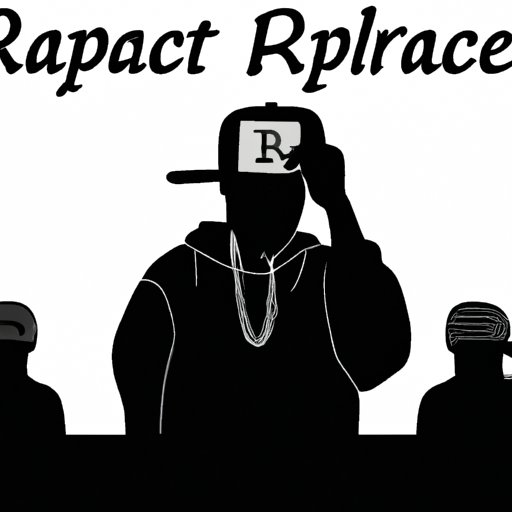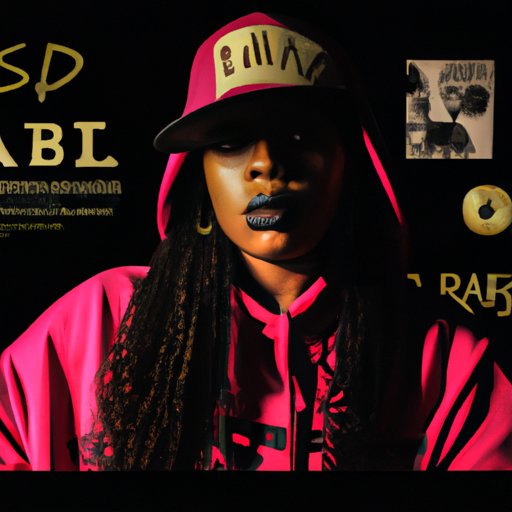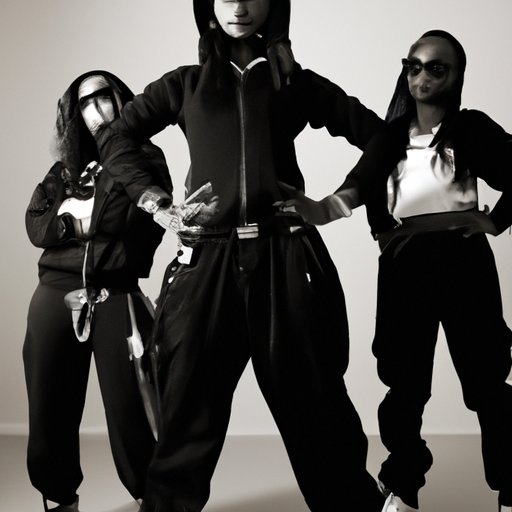Introduction
Rap and hip-hop music have become an integral part of our culture, but what exactly is rap and how is it related to black culture? To understand this, one must first define both rap and black culture. Rap is a style of music that originated in the United States in the 1970s. It consists of rhyming lyrics that are spoken or chanted over a beat or instrumental track. Black culture, on the other hand, is the shared experiences, beliefs, values, and norms of African Americans. This article will explore the impact of rap and hip-hop music on society by looking at the historical perspective of rap as a reflection of black culture, the social and political implications of rap music, the role of women in rap and black culture, the influence of hip-hop and rap on youth culture, and the lyrical content of rap music and its relationship to black identity.

A Historical Perspective of Rap as a Reflection of Black Culture
The roots of rap and hip-hop can be traced back to the early 1970s, when DJs began experimenting with mixing records in the Bronx, New York. This new form of music was heavily influenced by Jamaican reggae, which was popular in the area. As the genre developed, it became a tool for expressing the experiences of African Americans and reflecting their culture.
Evolution of Rap Music
Rap music has evolved significantly over the years, from its early days as a street corner art form to its current status as a multi-million dollar industry. Rap music has been used to express a wide range of topics, from personal struggles to social issues. The popularity of rap has grown exponentially since its inception, and today it is one of the most popular genres of music worldwide.
Cultural Significance of Rap Music
Rap and hip-hop music have become a powerful force in American culture, especially among young people. The genre has become a source of empowerment and inspiration for many African Americans, providing a platform to express their thoughts and feelings. It has also become an important tool for social commentary, as artists often use their music to address issues such as racism, poverty, and injustice. In addition, rap music has had a significant influence on fashion, language, and lifestyle.

Exploring the Impact of Rap Music on Society
Rap and hip-hop music have had a profound effect on society. The genre has been used to express both positive and negative messages, and its impact has been felt across a variety of social, political, and economic realms.
Social Effects of Rap Music
Rap and hip-hop music have had a significant influence on popular culture. The genre has been used to promote certain lifestyles and behaviors, such as materialism and violence. It has also been used to spread messages of self-empowerment and social justice. In addition, rap music has been used to provide a voice for marginalized communities, such as those living in urban areas.
Political Implications of Rap Music
Rap and hip-hop music have also been used to address a variety of political issues, including police brutality, racial inequality, and economic injustice. Artists have used their music to call attention to these issues and to encourage people to take action. Additionally, rap music has been used to criticize certain politicians and policies, which has resulted in increased public awareness and discourse about relevant political issues.

The Role of Women in Rap and Black Culture
Women have played an important role in rap and hip-hop music since its inception. However, they have often been portrayed in a negative light, as objects of male desire or as hypersexualized figures. Despite this, there have been a number of female rappers who have used their music to challenge traditional gender roles and advocate for female empowerment.
Representation of Women in Rap Music
Women have been largely underrepresented in rap and hip-hop music. While there have been a few successful female rappers, they have often been overshadowed by their male counterparts. Additionally, female rappers have often been portrayed in a sexualized manner, which has perpetuated negative stereotypes about women.
How Women are Portrayed in Rap Music
Although women have been largely underrepresented in rap and hip-hop music, there have been some notable exceptions. Female rappers such as Queen Latifah, Missy Elliott, and Nicki Minaj have used their music to challenge traditional gender roles and promote female empowerment. These artists have helped to create a more positive image of women in rap and hip-hop music, which has inspired many young women to pursue their dreams.
The Influence of Hip-Hop and Rap on Youth Culture
Hip-hop and rap music have had a significant impact on youth culture. The genre has become extremely popular among young people and has been used to express a variety of emotions and experiences. Additionally, rap music has been used to promote certain lifestyles and behaviors, such as materialism and violence.
Popularity of Rap Music Among Young People
Rap and hip-hop music have become increasingly popular among young people. The genre has become a tool for expression and has been used to address a variety of topics, from personal struggles to social issues. Additionally, rap music has been used to promote certain lifestyles and behaviors, such as materialism and violence.
Impact of Rap Music on Youth Identity
Rap and hip-hop music have had a significant influence on the identities of young people. The genre has been used to express a variety of emotions and experiences and has provided a voice to those who may not have otherwise been heard. Additionally, rap music has had an impact on the way young people dress and behave, which has led to the emergence of certain subcultures within youth culture.
Examining the Lyrical Content of Rap Music and Its Relationship to Black Identity
The lyrical content of rap and hip-hop music has long been a source of debate. Many argue that the genre promotes negative messages, while others argue that it provides a voice for those who may not have otherwise been heard.
Lyrical Content of Rap Music
The lyrical content of rap and hip-hop music varies greatly. Some songs contain positive messages about self-empowerment and social justice, while others contain negative messages about violence and materialism. Additionally, some artists use their music to address political issues, such as racism and inequality.
Relationship Between Rap Music and Black Identity
Rap and hip-hop music have become an important part of black culture. The genre has provided a platform for African Americans to express their thoughts and feelings and to address a variety of social and political issues. Additionally, rap music has had a significant impact on the way young people dress and behave, which has led to the emergence of certain subcultures within youth culture.
Conclusion
This article has explored the impact of rap and hip-hop music on society. It has looked at the historical perspective of rap as a reflection of black culture, the social and political implications of rap music, the role of women in rap and black culture, the influence of hip-hop and rap on youth culture, and the lyrical content of rap music and its relationship to black identity. The findings suggest that rap and hip-hop music have had a significant impact on society, providing a platform for African Americans to express their thoughts and feelings and to address a variety of social and political issues. Future research should focus on how rap and hip-hop music can be used to promote positive messages and behaviors, as well as how the genre can be used to challenge traditional gender roles and empower women.
(Note: Is this article not meeting your expectations? Do you have knowledge or insights to share? Unlock new opportunities and expand your reach by joining our authors team. Click Registration to join us and share your expertise with our readers.)
